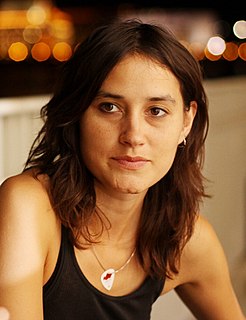A Quote by Adrienne Rich
One of the great functions of art is to help us imagine what it is like to be not ourselves, what it is like to be someone or something else, what it is like to live in another skin, what it is like to live in another body, and in that sense to surpass ourselves, to go out beyond ourselves.
Related Quotes
It is difficult to see ourselves as we are. Sometimes we are fortunate enough to have good friends, lovers or others who will do us the good service of telling us the truth about ourselves. When we don't, we can so easily delude ourselves, lose a sense of truth about ourselves, and our conscience loses power and purpose. Mostly, we tell ourselves what we would like to hear. We lose our way.
You just have to work, we all have to work really hard to take care of ourselves and feed ourselves good information, just like we feed ourselves good food. Feed ourselves good books and good messaging and the things that make us feel like we can be connected with ourselves and others in a deeper way.
Pity is a sense of our own misfortunes in those of another man; it is a sort of foresight of the disasters which may befall ourselves. We assist others,, in order that they may assist us on like occasions; so that the services we offer to the unfortunate are in reality so many anticipated kindnesses to ourselves.
When we choose to be parents, we accept another human being as part of ourselves, and a large part of our emotional selves will stay with that person as long as we live. From that time on, there will be another person on this earth whose orbit around us will affect us as surely as the moon affects the tides, and affect us in some ways more deeply than anyone else can. Our children are extensions of ourselves.
In modern society most of us don't want to be in touch with ourselves; we want to be in touch with other things like religion, sports, politics, a book - we want to forget ourselves. Anytime we have leisure, we want to invite something else to enter us, opening ourselves to the television and telling the television to come and colonize us.
We definitely needed to spend a good solid year just finding ourselves before anyone would even notice us. We had our fan-base growing around here in Los Angeles, but I wouldn't even have wanted anyone to come out to see us that was from a record label or something like that at that time, because we really needed to feel ourselves out as a live band.
A poem is a place where the conditions of beyondness and withinness are made palpable, where to imagine is to feel what it is to be. It allows us to have the life we are denied because we are too busy living. Even more paradoxically, poetry permits us to live in ourselves as if we were just out of reach of ourselves.
[Grace] is given not to make us something other than ourselves but to make us radically ourselves. Grace is given not to implant in us a foreign wisdom but to make us alive to the wisdom that was born with us in our mother?s womb. Grace is given not to lead us into another identity but to reconnect us to the beauty of our deepest identity. And grace is given not that we might find some exterior source of strength but that we might be established again in the deep inner security of our being and in learning to lose ourselves in love for one another to truly find ourselves.







































